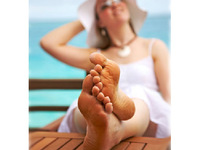Time to rest your legs?
 Do you have legs that twitch when trying to relax or sleep and often painful sensations creating an overwhelming urge to move? You are not alone. This is a problem affecting over 1.5 million people in the UK alone (thought to be a conservative estimate with figures of over double believed to be more realistic) who suffer from a condition known as Restless Legs Syndrome (RLS).
Do you have legs that twitch when trying to relax or sleep and often painful sensations creating an overwhelming urge to move? You are not alone. This is a problem affecting over 1.5 million people in the UK alone (thought to be a conservative estimate with figures of over double believed to be more realistic) who suffer from a condition known as Restless Legs Syndrome (RLS). RLS is now recognised as an official medical condition that can be very distressing and debilitating. However, it commonly goes undiagnosed, and is even less talked about, with sufferers often unaware there is help available.
Affecting women much more than men, the uncomfortable sensations of RLS are usually triggered by inactivity, are often more noticeable in the evening and, for some can prevent sleep.
Sufferers report the inability to relax and sit still, alongside which disturbed sleep often impacts on their daytime activities. Lesley Williams from Leyburn, Yorkshire, an otherwise fit active Mum of three, recognised that the involuntary twitching she was beginning to experience was in fact the same problem that had afflicted her mother for over ten years. Unable to sit still in the evenings, at the cinema or on long car journeys, RLS was preventing her from enjoying her life and she was worried since her GP could offer no solution.
Whilst symptoms of RLS can be temporarily relieved by movement there is little in the way of long term medical treatment available. GPs, however, sometimes prescribe drugs used to treat Parkinson disease since low dopamine is implicated in RLS.
There has recently been growing excitement that a natural remedy may be able to help those with RLS. It is seen that a blue-green algae Aphanizomenon flos-aquae, specifically from the Klamath Lake in the USA, is a very high source of phenylethylamine (PEA). Phenylethylamine is a vital nutrient needed to produce dopamine (low levels of which are thought to be linked to RLS) in the body but is very rare in nature – hence the excitement over Klamath blue-green algae.
It is thought that PEA is capable of raising the levels of freely circulating dopamine in the brain, and therefore Klamath blue-green algae could offer a natural remedy for RLS.
Simply Vital Ltd, a company who are committed to delivering holistic prescriptions to nourish and nurture body, mind and emotions to achieve whole health, have just launched the UK’s most concentrated Klamath blue-green algae product on the market – VitalCALM.
For more information visit simplyvital.com.

